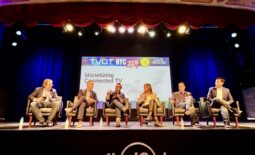The 1964-65 New York World’s Fair was the touchstone of a futuristic vision that predicted videophones, connected devices, and advanced – if not flying – automobiles. It has taken, literally, 50 years for that vision to become some sort of reality. And, in very palpable terms, that is what was on display at CES 2016 in Las Vegas last week. From Samsung’s SmartThings platform – with connected refrigerators – to the Faraday Future FFZero1 concept car – 1,000 horse power electric vehicle that makes Bruce Wayne’s Batmobile look like a tricycle – the CES 2016 floor and suites gushed with technology that now begins to flesh out a picture of the 21st century as we knew it…in the 1960s.
It was a long and productive week for Chris Pfaff Tech Media at CES 2016. We arrived on Sunday, January 3rd, just in time to see Chinese New Year’s displays going up at the Bellagio. I moderated a session at Storage Visions, at the Luxor, on Monday the 4th, ‘Epic Proportions: Storage for High Resolution Content Capture and Production,’ which featured an all-star panel of industry experts (Avid’s Gary Green; DDN’s Molly Rector; EMC’s Tom Burns; Panasas’ David Sallak) discussing the need for ever-larger storage workflows for production and post-production. With 4K content the big buzz at the show, storage should have had a larger presence, but the fact is that it is now more relevant than ever. The “consumer cloud” that envelops all of us is an outcropping of the enterprise storage world that enables blockbusters such as ‘The Martian’ and ‘Mad Max: Fury Road’ to lock picture. I prefaced my introductions by encouraging the audience to repeat after me: ” I am. Storage Sexy.” The industry segment that has long been the grey face of progress (even though the likes of Box.net and Dropbox consume more syllables on CNBC than just about any other twosome) is now in a powerful perceptual position. I had the chance to catch up with ex-InPhase Technologies execs Will Loechl and Ken Anderson, who now lead Akonia Holographics, the descendant of the holographic company that we represented for 8 years. Akonia is moving forward with its drive and media, and should have something on the market in 2018.
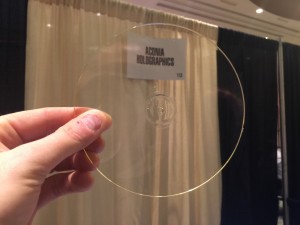
The Akonia Holographics media, at Storage Visions 2016, at CES 2016, at the Luxor Hotel
It was a busy week, otherwise, with meetings all over Las Vegas, and well into the night. The best party, hands-down, was the Havas Media event at the Palazzo on Tuesday night, which featured Joe Jonas’ new band, DNCE (courtesy of Havas’ relationship with Universal Music Group), a tight quartet that blended bouncy pop-funk material with some expert covers. Havas CEO/chairman Yannick Bolloré and UMG’s Mike Tunnicliffe were emcees for the soiree.
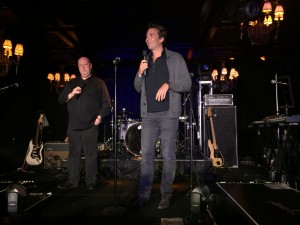
Mike Tunnicliffe, EVP, Business Development & Partnerships, USA for Universal Music Group, and Yannick Bolloré, chairman and CEO of Havas, at the Palazzo Hotel
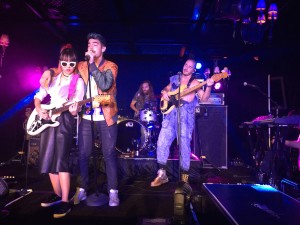
Joe Jonas, 2nd from left, and his band DNCE, at the Havas CES 2016 party at the Palazzo Hotel
For the second time, I joined the incredible (and growing) team of experts – including NBC Universal Media Labs execs – that Shelly Palmer assembled for the official CES Trendspotting tours on the CES show floors. While I covered the “Tech East” (read: Las Vegas Convention Center) arena with colleagues, another team covered the “Tech West” (read: Sands/Venetian convention centers) arena.
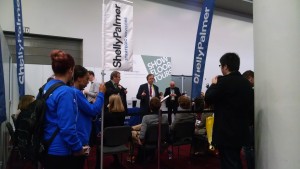
Chris Pfaff addresses a CES 2016 VIP Trendspotting tour in the Las Vegas Convention Center
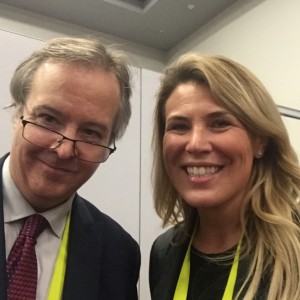
Chris Pfaff and Fielding Kidd, manager of innovation programs at NBC Universal
This year’s mind-blowers included the amazing Intel RealSense/Curie content display with a video wall of digital “fish” that responded to Curie chip-enabled bracelets and RealSense cameras that tracked movements. “Air Instruments” of bungee chords that produced tonal music rounded out the experience. Intel made a big splash with its announcement of the $10 Curie chip – a button-sized System-on-a-Chip (SoC) that is low-power and high energy.
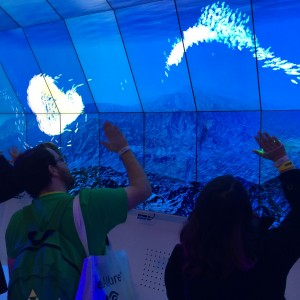
Intel RealSense and Curie demo at the Intel booth at CES 2016
Samsung featured a riot of new things, including a sensorround display of its Samsung Gear VR product, which had previously been released in Q4 ’15 for $99.00. But the biggest relevation was its Soundbar product, a Dolby Atmos-enabled answer to the Amazon Echo speaker. The Soundbar was featured in one of the best home theater demos I have ever seen, which paired a Samsung SUHD 4K television with the Soundbar, producing a powerful immersive cinema experience.
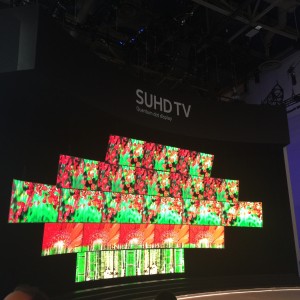
Samsung’s SUHD TV 4K content display at CES 2016
Internet of Things (IoT) solutions were everywhere at the show, and nowhere was this more evident than in the automotive section in the North Hall, with Toyota announcing its $1 billion Toyota Research Institute, a partnership that includes Stanford and M.I.T. Toyota also showed off its ultra-cool Kikai (which means “work” in Japanese) concept car, a Rube Goldberg-inspired vehicle.
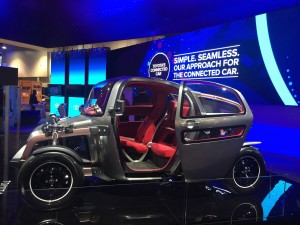
The Toyota Kikai concept car at CES 2016
Ford had a massive booth that showed off its LiDar-enabled concept car, and touted its partnership with Amazon’s Alexa platform. Ford’s mobile partner, Blackberry, had a presence in the North Hall with its ONX platform. Audi had the best-designed booth at the entire show, and Kia showed up for the first time.
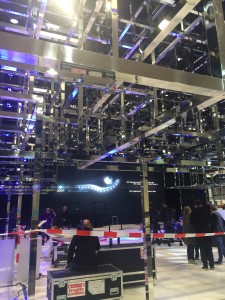
Audi’s booth at CES 2016 was a mechanistic orgy of chrome piping
But, the winner in the automotive sector at CES 2016 was the Faraday Future FFZero1 concept car, a 1,000 horsepower electric vehicle that is a single-occupant vehicle. Faraday Future became the first automotive company to launch a new car at CES. This is significant: car introductions are almost exclusively the province of automotive shows. Faraday Future made a secret launch in a parking lot off the Las Vegas Strip, and then assembled its booth in the North Hall in 6 hours, with the car in tow. Faraday Future is backed by the Chinese conglomerate LeTV, which announced a $1 billion factory launch in Las Vegas for its cars. Watch this company.
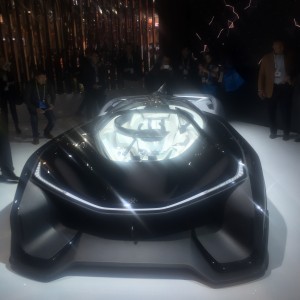
Faraday Future’s FFZERO1 concept car (1,000 horsepower electric vehicle) at CES 2016
Speaking of LeTV, they had a strong presence at the show, with a booth in the South Hall that displayed their power in telecom, consumer electronics, film/TV, and gaming. They are moving into the U.S. market in a big way, and will become more of a force in the coming year.

Panoramic shot of the LeTV booth at CES 2016
On the other end of the dial, Sony Electronics – while sporting a newly designed, and friendlier booth – looked somewhat forlorn, and we captured CEO Kazuo Hirai in a pre-show interview on the first day looking rather wan.
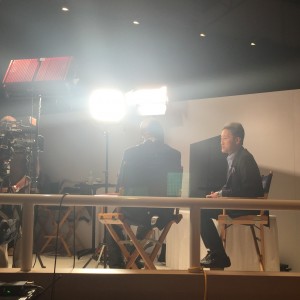
Sony’s CEO, Kazuo Hirai, during an interview in the Sony booth, pre-show on Day 1 of CES 2016
The Sands/Venetian halls were filled with even more wearables companies, expanding the health and sleep-tech sectors, and 3D printing was as hot as ever. But the real revelation was a vastly expanded Eureka Park start-up zone, which was located downstairs, and featured more than 500 start-ups. One of the coolest things I saw at the show was from UK firm Kino-Mo, which showed off its projectable hologram solution. This was an eye-catcher, and of real interest given that the company is now selling its solution to retailers. Other cool bits in Eureka Park included Plussh, a newly-launched mobile video platform that was part of the massive French start-up contingent at this year’s show. For the 2nd straight year, France had the largest national presence, next to the U.S., at CES (remember, people – “entrepreneur” is a French word). There were far more countries represented in Eureka Park this year, and the university accelerator section was also expanded. This is a healthy sign, indeed.
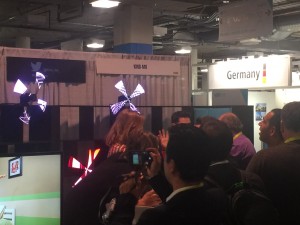
Kino-Mo shows off its holographic projection technology at Eureka Park start-up zone at CES 2016
While this year’s CES was the largest ever (more than 176,000 attendees), it has become more of an “information” show in its envelopment of the advertising and media industries. While fewer celebrities attend the show on behalf of exhibitors or studios/networks, CES is of huge interest to the advertising congloms that need to show relevance to their clients. And, of course, this enhances the overall experience for technology developers. We hope to see next year’s show increasing the media/marketing presence.
That’s a wrap from CES 2016. Now, we have to get out there and start living on the promise of that New York World’s Fair – which finally arrived, in some form, in Las Vegas this year.
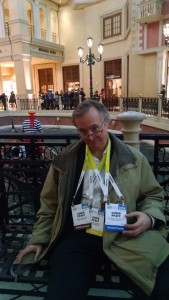
He who wears the most badges wins: Chris Pfaff at the Venetian Hotel Grand Canal, at the end of CES 2016
